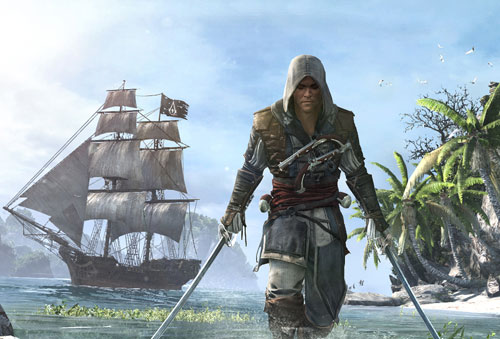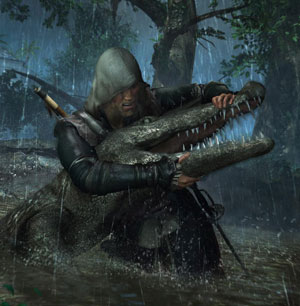Blog / What Shall We Do With A Drunken Sailor?
- Date
- November 23, 2013
- Tags
Day two was about Assassin’s Creed IV: Black Flag. It only took five years and six games, but Ubisoft’s pirate adventure is the best entry in the series and my selection for Game of the Year.
What makes a good game? More than books, music, and movies, video games let you feel like you’re someone else. The graphics, sound, story and gameplay mechanics merge together to turn a dual-stick ten-button controller into a gateway to another world.
Ninja Gaiden for Xbox was the console game I remember to give the sensation that you’re someone else. As Ryu Hayabusa I could flip off walls, toss shurikens, and cast awesome magic spells. The mechanics were so finely tuned that with some practice Ryu became an extension of your own will.
Dark Souls achieved the same effect. You’re a lone undead warrior in a horrifying realm. Any enemy can kill you just as easily as you can kill them. The game never had to shake the camera or let out screechy noises to scare you. Player buy-in was total.
Now we have Assassin’s Creed IV to make you feel like a pirate. Tell Jack Sparrow to eat his heart out.

What are the major gameplay mechanics of the Assassin’s Creed series? Let’s desconstruct and analyze.
- Running/climbing is more or less unchanged from the last game. You can climb trees and leap between branches. There are zipline things to take you up buildings in a hurry. When it works, it’s joyous. I crept towards a group of pirates in a swamp, stalking their leader from the trees. In one fluid run I circled the camp and dove onto the man’s back, my wrist blade piercing his neck and staking him to the ground. Glorious! And then there are the ten thousand other times where I tried to tackle a courier or chase a fleeing scrap of paper but ended up headbutting a wall until I failed the activity. Frustrating! Ubisoft has the most advanced character animation system in the world yet it still struggles to interpret player intent. You’ll scale the wrong building or hop around idiotically at any moment. Perhaps this would be improved if players could see some debugging information, a path or compass that the game is going to use to direct your character, like a contrail moving in front of you. The system is functional, fluid, but finicky.
- Combat is still awful. Good grief. There’s not even a proper tutorial this time, so I’ll give you one. Here’s how to win every fight in all Assassin’s Creed games after the first one: stand perfectly still and wait for an enemy to attack. Press B to counter, then X to kill him. If X doesn’t work, press A the next time they attack to disarm them, then hammer on the X key. If the option comes up to use a combatant as a human shield, press that button. Repeat until you’ve won. It’s mystifying how a bland and unchallenging fighting engine could go this many years without improvement. Just consider it an easy minigame. At least it’s no longer the unfair slog of the first game.
- Stealth is great once you’re used to it. See that awful combat system I just described? Here’s how you avoid it and have fun with the Assassin’s Creed IV: pretend it’s a stealth game. Use eagle vision (which main character Edward Kenway has for some reason) to mark and track targets. Hide in the abundant cover. Guards have much simpler patrols now, their numbers are smaller, and the landscape is littered with traps for stealthy kills. While there aren’t a lot of tools and the AI is pretty much brain dead, it’s a far better experience than brazenly walking into the restricted area and slaughtering a dozen guards while forcing back yawns.
- Hunting was introduced in Assassin’s Creed III and is back as a shell of its former self. Thank goodness. Stalking deer, crocodiles, and ocelots with their fox ears is as easy as walking up to one and shooting it with a pistol. No more of that baiting/trapping/tracking silliness. I haven’t gotten to whale hunting or shark combat yet, but they seem exciting. What’s more, hunting is about more than money now. Upgrades to your character’s weapons and armor require rare skins from exotic animals, sending you across the Carribbean in search of awesome animals. Why yes, they did take this wholesale from Far Cry 3. Shut up. It works way better.
- Ship combat also returns as more mountain than molehill. It’s the glue that holds the entire game together and gives you a reason to do what you’re doing. This is where Assassin’s Creed IV shines and - happily - where you’ll spend most of your time. Naval combat is exciting and challenging, with complicated positioning, reflex tests, and planning issues that are slowly introduced and neatly layered. Taking on a huge brig, its two gunboat escorts, and sinking the lot of them might be my best gaming memory of 2013. There are so many little details to enjoy. Your crew sings authentic sea shanties which you can find by completing rooftop challenges on land. At top speed the camera pulls way back to let you enjoy the freedom of the open sea. Water surges over the side and streams away, making the deck look authentically wet. Waves are real and affect combat. Fighting in calm seas and crazy storms are two utterly different experiences.
- Talking is so much briefer than before. You’re not a Templar nor an Assassin, which means you don’t have to listen to dozens of speeches about controlling the destiny of the world. Kenway isn’t quite up to Ezio Auditore’s swarthy charm, but he has enough flavor to express the player’s desires without coming off too strong or too bland.
The most important part, something I thought Ubisoft would never fix, is the game balance. In Assassin’s Creed II you managed a villa that paid you money on a regular schedule. You could use that money to upgrade your villa and it would pay you even more money. This tidal wave of cash made all the assassination missions in cities pointless. Why earn a thousand gold for killing this guy when I can wait six minutes and get another ten grand from home? I’ll admit never getting far in Assassin’s Creed III due to other reasons, but I never felt a drive to earn money as Connor.

As Edward Kenway, captain of the Jackdaw, money flows in and out at a terrific pace. There’s no automatic cash infusion and a proper segregration of currencies. You pick up three hundred gold from the many treasure chests scattered on the landscape. More for the rum and sugar you find and plunder. Two thousand from a slightly rare assassination contract. Or take on the dangerous ships to steal their money. Every royal you receive is well earned.
And well spent. Your ship devours cash, but Edward’s combat and cosmetic upgrades will suck up any excess coin. Not to mention the pirate cove you create (forgot to mention there’s a pirate cove). Repairs to your ship, bribing officials, loosening the tongue of bartenders… you’re always a happy pauper.
Outside of the Animus is a strange, narcissistic experience. You actually play as a new employee for the bad guys, Abstergo, whose job is to sit in these luxurious cubicles inside an opulent office and play Assassin’s Creed IV. Which is a real thing in the game universe. I can see the developers at Ubisoft drooling over the environment they’ve created, but we’re really in Ouroboros territory now. It’s a hilarious experience, reading absurdly cryptic post-it notes, hacking into people’s computers, looking at the assassin action figures people keep on a special shelf. I can’t wait to see where it leads.
In fact, that might be the theme of the entire game: what’s next? What undiscovered coconut island will I find next? What will my men sing next on our voyage? What will the next treasure map unlock? What will the weather be like during my next naval battle? So many systems and possibilities feed into each other to keep me glued to the game all day long.
Took them long enough, but Assassin’s Creed has found its winning formula.
I love being a pirate. What’s next?
